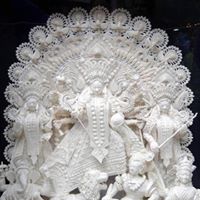What is petrichor?
Petrichor is a distinctive scent, usually described as earthy, pleasant, or sweet, produced by rainfall on very dry ground. The word is constructed from the Greek petra, meaning "stone", and "īchōr", the ethereal fluid flowing in the veins of the gods in Greek mythology.
This relatively new word was devised in 1964 within CSIRO (Australia’s national scientific research agency - The Commonwealth Scientific and Industrial Research Organisation), the chief role of which is to improve the economic and social performance of industry for the benefit of the community.
Two CSIRO researchers, Isabel Joy Bear and Richard G. Thomas, wrote an article in the journal "Nature" in which they described how the earthy smell after rainfall derives from an oil exuded by certain plants during dry periods. This oil is absorbed by clay-based soils and rocks. During rain, the oil is released into the air along with another compound, geosmin, a metabolic by-product of certain actinobacteria, which is emitted by wet soil, producing the distinctive scent, petrichor. In soil actinobacteria behave much like fungi, helping to decompose the organic matter of dead organisms so that the molecules can be taken up anew by plants.
More Info:
en.wikipedia.org








